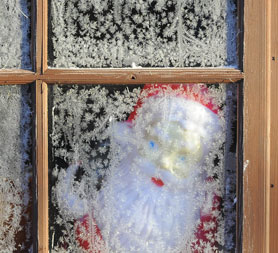Cold weather leads to rise in fuel poverty
Freezing weather and rising energy bills are pushing more people into fuel poverty, Channel 4 News is told.

The cold snap coincides with the decision by four of the big six gas and electricity companies in Britain to raise their prices, making it highly likely that more households will find themselves in fuel poverty (spending more than 10 per cent of their income on heating bills).
Npower announced a 5 per cent hike in bills last week, to take effect next month. Scottish Power, SSE and British Gas have also increased their prices, while EDF Energy has decided to freeze bills and E.ON has yet to make a decision.
In 2008, there were 4.5 million households in the UK in fuel poverty. The Government estimates that this fell to 4.1 million in 2009, but admits that more people will be dragged into fuel poverty in the months ahead as energy prices rise.
A spokeswoman from the Department of Energy and Climate Change (DECC) said: “If prices go up, it will mean more people in fuel poverty.”
With the cold conditions, wholesale gas prices have risen to a two-year high, according to ICIS Heren, the information service provider. Prices have reached more than 70p a therm, with gas demand close to record levels.
Winter deaths
The weather could lead to a rise in excess winter deaths (EWD), the difference between the number of deaths in the winter months and the average number of deaths the preceding autumn and the following summer.
In 2009-10, there were 29,000 EWDs in the UK, mostly affecting the over-65s. The UK has one of the highest rates in northern Europe. A 2003 study revealed that only Ireland had a higher rate.
One of the highest winter mortality rates in Europe. Michelle Mitchell, Age UK
Michelle Mitchell, Age UK charity director, said: “The simple fact that the UK has one of the highest winter mortality rates in Europe – higher than even Sweden or Finland – makes it clear this is very much a home-grown problem.
“Behind these shocking statistics lie deep-seated social issues, such as 3.5 million older people in fuel poverty – a figure that could rise even further under the combined pressure of soaring energy bills and plummeting temperatures.”
Christine McGourty, director of Energy UK, which represents the major gas and electricty companies, said: “We understand that in the current tough economic climate, some people may be worried about paying their bills.
“The leading gas and electricity companies spent £150 million last year on voluntary help for customers in difficulty, especially the elderly and those on certain benefits. This help includes things like free insulation, trust funds and rebates, and discounted prices for people who find it difficult to keep their homes warm.”
Help with heating
Last week, the DECC said it would not be accepting any new applications until April 2011 for its Warm Front scheme, which helps people who are disabled or on benefits heat and insulate their homes.
In 2010-11, grants will have helped 170,000 people, half of them in fuel poverty. Funding for the scheme is being cut from £345m to £100m, and the department wants it better targeted at people living in fuel poverty.
In 2012, the Green Deal will be introduced to help people insulate their homes. The costs are added to bills, but DECC says people will be better off because they will use less energy.
Some people receive help with their energy bills. Winter fuel payments of up to £400 are available for pensioners, who, along with families with children under five on income-related benefit, also receive cold weather payments of £25 a week when temperatures fall.